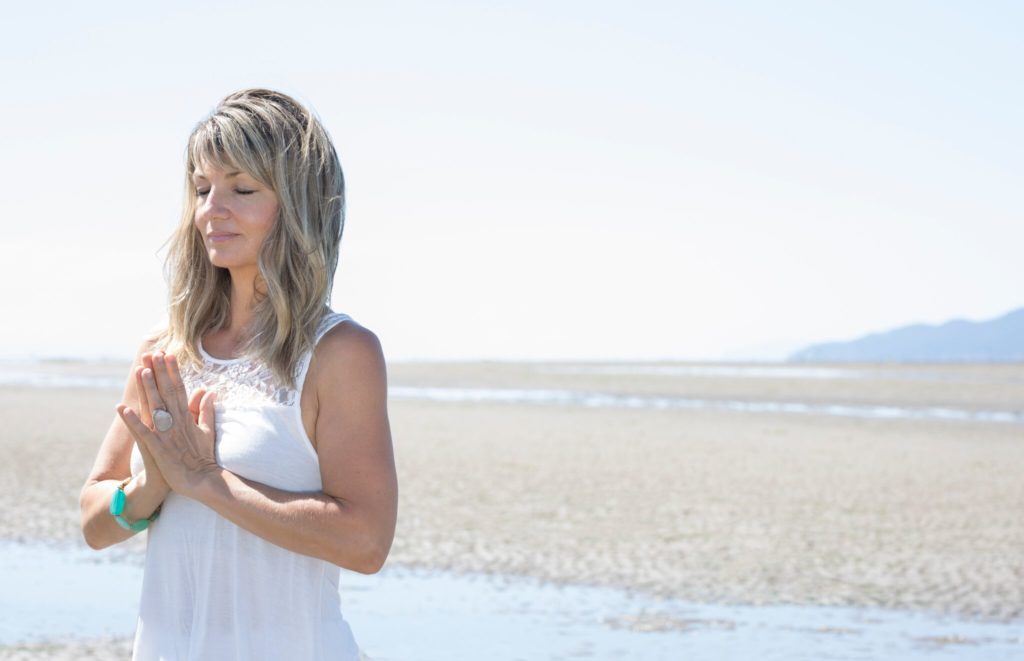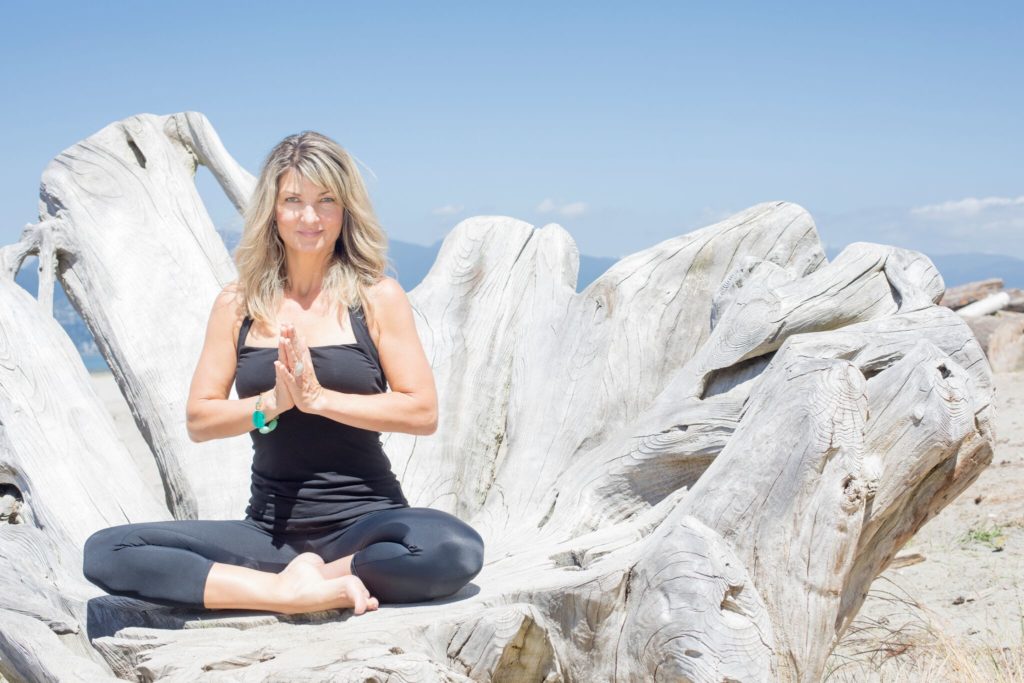
Lisa Dumas: Yoga Teacher & Mind Body Coach – Guest Feature
As part of our dedication to bringing you new resources for increasing happiness, we share spotlights on distinguished and interesting individuals. This week we’ve got Lisa Dumas, Mind-Body Coach who specializes in Yoga and overcoming anxiety. Big thanks to Lisa for taking the time to answer these questions and share with us. Let’s get into it, shall we?
Out of all potential happiness tools, why do you think yoga resonated with you most?
The experience of my first yoga class made such a profound impression on me that it launched me into an exploration of the yoga tradition that I continue to this day as a committed student, and will continue for the rest of this life. When yoga found me, I knew I wasn’t happy. Like most of us, I had absorbed the false belief that happiness is the preferred emotion; if you aren’t happy, you aren’t whole. I’ve discovered there are worlds of “tools” within the science of yoga that offers the practitioner the experience of reuniting all aspects of self into a unified whole, rather than rejecting the uncomfortable and chasing the pleasurable. Yoga helps us become present in our bodies, awake to the nature of the mind and the subtler, energetic aspects of being human.
For me, because I was so dissociated from my body due to my fear of regular panic attacks and intense nervousness, the act of concentrating on a yoga posture helped me to build a new relationship to my body. Placing focus on my physical body helped me become present, which I had no previous experience with, I was always regretting the past, or worrying about the future.
With yoga, I become familiar with the “now”, which offered me access to the existence of inner contentment rather than spending my hours in an endless fearful inner dialogue.
Adding deep and slow breathing to the experience of “being in my body” soothed my body which offered me an unfamiliar but welcome state of calm. Accustomed to shallow, panicky breath that overstimulated the “fight or flight” nervous system, a slow and deep breath pattern nourished my body which in turn began to calm my mind. With the guidance of teachers, I began to learn that our thoughts create our lives and that my thoughts were not me!
I practiced remaining present, witnessing my thoughts instead of reacting to them. I noticed how my thoughts created so much suffering in my life. The aim of yoga is to reduce the suffering in our minds. It’s not that yoga provided me happiness necessarily, but it offered me the methods to get out of my own suffering and reveal the deep peace that I believe does reside within us already.
What would you say is the first step for others to start overcoming anxiety or other struggles?
For me the first step is awareness. For many years, I was not willing to accept the reality that I was suffering from a disorder. I kept the truth hidden as much as possible, which only increased my pain. I isolated myself and experienced a lot of shame; believing I was broken and a freak. I didn’t want people to know just how deeply fear had me in its grip. Shame is an insidious emotion, it thrives and grows in secrecy. The moment we reach out, talk to someone, share our truth, it begins to retreat. As soon as we pay attention to what may not be working in our lives, it can start to change. I would also recommend moving away from over-identifying with our challenges. Anxiety is a term for something that challenges us, we are not our anxiety.
What inspired you to create your worrier to warrior workshops?
I can only teach to the extent of my own understanding. Because yoga postures, meditation, contemplation, mudras and other forms of self-discovery helped me to conquer unhelpful fear, I tend to teach through that lens. When I began to speak openly about struggling with disordered anxiety, I was approached after classes by those that live where I had been, feeling alone and hopeless.
The concepts and practices I share helped to save my life. It’s taken years to receive, integrate and gather the techniques I offer in the workshop. I feel compelled to share them and empower others to help themselves heal. I also intend to convey a sense of community and sharing- struggling with anxiety doesn’t mean we’ve done something wrong, or we are something wrong. Countless people battle unhelpful fear. The workshop offers permission to anchor back into self-worth and release shame.
What is your grand vision or the biggest project you’re undertaking currently?
I practice what I preach and have a regular morning ritual that helps me stay connected to self-worth, so anchored there, I have been writing a book also called “Worrier to Warrior”. It’s part memoir as I share my personal experience with anxiety and panic and part guide as I offer calming and insightful practices for the body, the mind, the heart and the soul. I also plan to create an online version of Worrier to Warrior Training with a percentage of the profits going towards organizations involved with mental health awareness and support.
What book do you most often recommend and why?
For students wanting some deeper knowledge I often recommend The Wisdom of Yoga by Stephen Cope because it’s a beautifully and accessibly written distillation of some classic yogic concepts and how we can apply these teachings to our modern lives. Recently though, I can’t say enough about The Four Desires by Yogarupa Rod Stryker, which is a book that teaches a system of identifying and living your specific life purpose. It’s a writing that is supporting me deeply now.
What is one actionable exercise or reflection question you think would help people increase their happiness?
It’s helpful to simply ask ourselves what we are thinking. Most of our daily rumination is repetitive, negative and unconscious. Because our thoughts create how we feel and how we feel creates the actions we take in our lives it’s important to know what we are thinking at any given time.
Take a few minutes to write down all the thoughts that arrive to you and question them. Notice if they’re helpful or true, see if you can create an intention to let go of thoughts that don’t serve you. It’s a process that takes practice and most of all compassion. Paying attention to our thoughts can also inspire us to improve their quality and focus on speaking to ourselves MUCH more kindly. Yes, there are always ways we can rise to our best selves and find more freedom from suffering, but yoga philosophy also reminds us that at our essence, there is love.
Want More From Lisa Dumas? Check Out These Resources:
 I am accepting clients to work with on an individual basis via Skype. These sessions are powerful and unique in that I help guide people into a conversation with their bodies before we move on to address thoughts and emotions. I offer many tools and practices in these sessions including how to create healthy boundaries, release shame and tap into personal power and self-worth. More information about working with me is available here: http://lisadumasyoga.com/workwithme/
I am accepting clients to work with on an individual basis via Skype. These sessions are powerful and unique in that I help guide people into a conversation with their bodies before we move on to address thoughts and emotions. I offer many tools and practices in these sessions including how to create healthy boundaries, release shame and tap into personal power and self-worth. More information about working with me is available here: http://lisadumasyoga.com/workwithme/
Instagram: https://www.instagram.com/lisadumasyoga/
